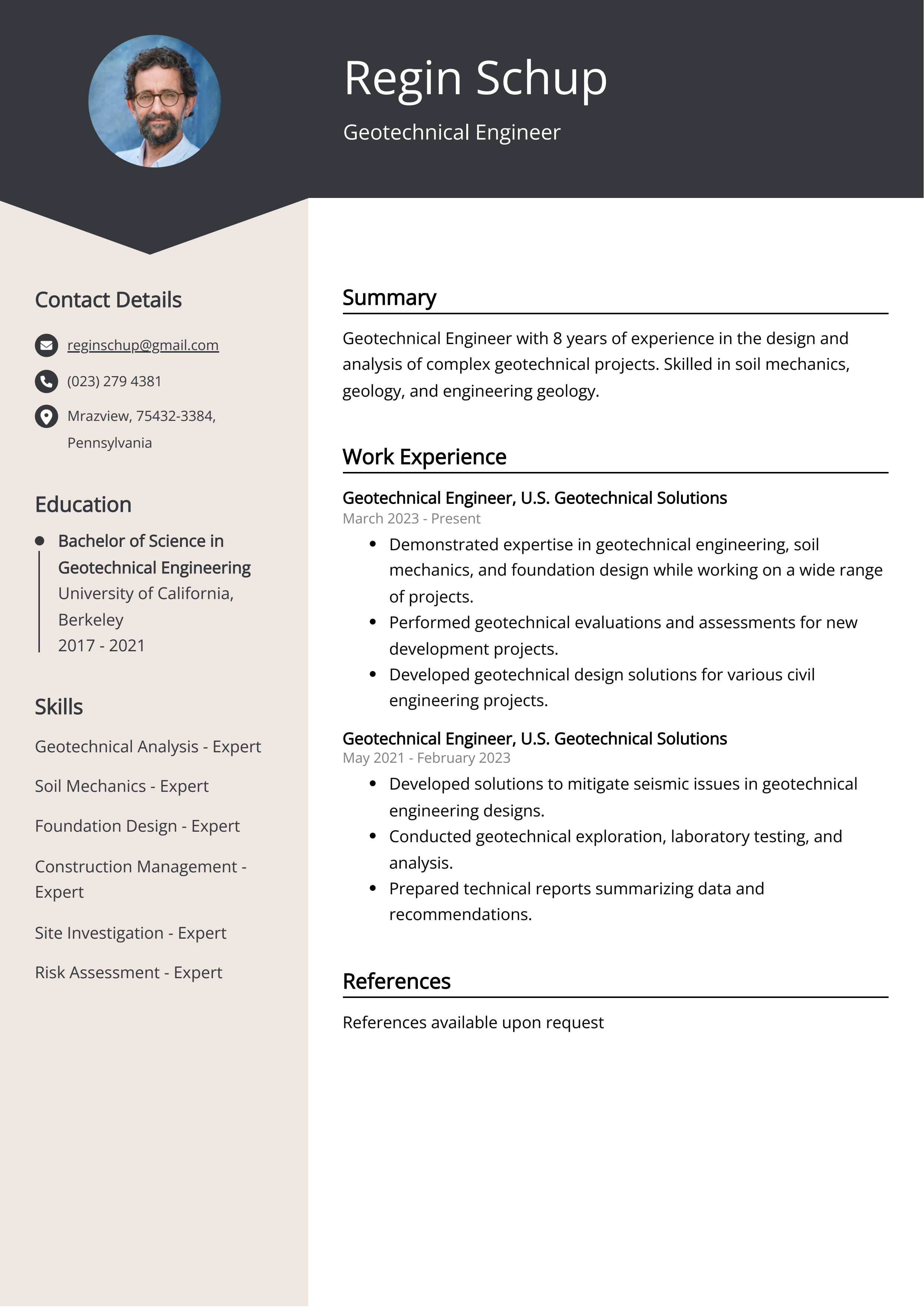Some Of Geotheta
Some Of Geotheta
Blog Article
5 Easy Facts About Geotheta Described
Table of ContentsGeotheta Can Be Fun For EveryoneWhat Does Geotheta Do?The Best Guide To GeothetaThe 7-Minute Rule for GeothetaAbout Geotheta

They carry out website examinations, gather examples, carry out lab tests, and analyze data to assess the suitability of the ground for construction tasks - Geotechnical Engineers. Based on their searchings for, geotechnical designers supply referrals for structure style, incline stability, maintaining frameworks, and reduction of geotechnical threats. They work together with various other professionals, such as architects, structural engineers, and building and construction teams, to make sure that geotechnical factors to consider are incorporated into the total project design and execution
By assessing the actions and homes of dirt and rock, they can determine potential geotechnical hazards such as landslides, dirt settlement, or slope instability. Their experience helps avoid failures or mishaps that might jeopardize lives and home. Here are some thorough tasks and obligations of a geotechnical engineer: Site Examination: Geotechnical engineers conduct website examinations to gather information on subsurface problems.
They analyze the data to comprehend the residential properties and behavior of the soil and rock, including their stamina, permeability, compaction qualities, and groundwater problems. Geotechnical Evaluation and Design: Geotechnical engineers examine the data gathered throughout site examinations to analyze the stability and viability of the website for building tasks. They execute geotechnical estimations and modeling to assess elements such as birthing capability, negotiation, slope stability, lateral earth stress, and groundwater circulation.
Facts About Geotheta Uncovered
Structure Style: Geotechnical designers play a crucial function in developing structures that can securely sustain the desired structure. They examine the soil problems and lots requirements to determine the suitable foundation kind, such as superficial foundations (e.g., grounds), deep foundations (e.g (https://www.awwwards.com/geotheta/)., heaps), or specialized strategies like soil enhancement. They take into consideration elements such as negotiation limitations, birthing capability, and soil-structure communication to develop ideal structure styles
They examine building plans, screen site tasks, and perform area examinations to confirm that the design recommendations are complied with. If unforeseen geotechnical issues develop, they analyze the circumstance and give recommendations for remediation or adjustments to the style. Threat Assessment and Reduction: Geotechnical engineers evaluate geotechnical threats and risks related to the job site, such as landslides, liquefaction, or soil erosion.

Collaboration and Interaction: Geotechnical designers work closely with other experts associated with a project, such as engineers, structural engineers, and construction teams. Efficient communication and collaboration are necessary to incorporate geotechnical factors to consider into the general job style and construction process. Geotechnical engineers give technological know-how, answer inquiries, and make sure that geotechnical requirements are met.
The Facts About Geotheta Revealed
Right here are some kinds of geotechnical engineers: Structure Engineer: Foundation designers concentrate on developing and assessing structures for structures. They analyze the dirt problems, tons requirements, and website qualities to establish the most ideal foundation type and style, such as shallow foundations, deep foundations, or specialized techniques like stack structures.
They examine the elements influencing incline stability, such as dirt residential or commercial properties, groundwater problems, and slope geometry, and develop approaches to avoid incline failings and mitigate risks. Quake Engineer: Earthquake engineers specialize in analyzing and making frameworks to hold up against seismic forces. They evaluate the seismic risk of a website, evaluate dirt liquefaction possibility, and develop seismic style standards to make sure the safety and durability of structures during quakes.
They do field screening, accumulate examples, and analyze the gathered data to identify the dirt homes, geologic formations, and groundwater conditions at a site. Geotechnical Instrumentation Designer: Geotechnical instrumentation designers concentrate on monitoring and determining the habits of soil, rock, and frameworks. They install and preserve instrumentation systems that monitor elements such as dirt settlement, groundwater degrees, incline movements, and structural displacements to analyze efficiency and offer very early cautions of possible concerns.
The Facts About Geotheta Uncovered
They conduct tests such as triaxial tests, consolidation examinations, direct shear examinations, and permeability tests to gather data for geotechnical evaluation and layout. Geosynthetics Engineer: Geosynthetics engineers concentrate on the design and application of geosynthetic materials, such as geotextiles, geogrids, and geomembranes. They use these products to boost dirt stability, reinforce slopes, supply drainage solutions, and control disintegration.
They often tend to be investigative people, which suggests they're intellectual, introspective, and inquisitive. They wonder, systematic, logical, logical, and rational. A few of them are additionally social, Consulting Engineers indicating they're kind, generous, participating, individual, caring, helpful, compassionate, skillful, and friendly. Does this seem like you? Take our complimentary career examination to discover if geotechnical designer is among your leading profession suits.
In the office atmosphere, geotechnical engineers make use of specialized software application devices to execute computations, produce styles, and examine data. They prepare records, evaluation project requirements, communicate with clients and group members, and coordinate task activities. The office setting offers a helpful setting for research study, analysis, and partnership with other professionals involved in the job.
Geotheta - The Facts
They frequently see task sites to conduct website investigations, analyze geotechnical problems, and collect information for evaluation. These sees entail traveling to different areas, occasionally in remote or challenging terrains. Geotechnical engineers may execute dirt sampling, conduct tests, and screen construction tasks to make sure that the geotechnical aspects of the project are being implemented appropriately.
Geotechnical engineers additionally work in specialized geotechnical labs. Geotechnical research laboratory engineers work extensively in these settings, handling testing equipment, running instruments, and videotaping data.
Report this page